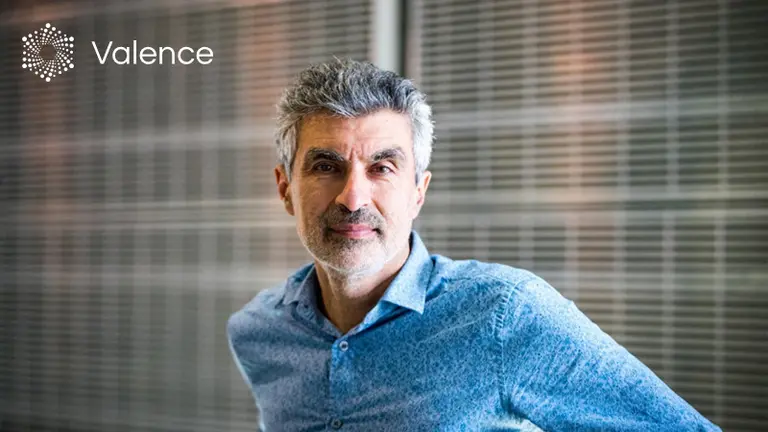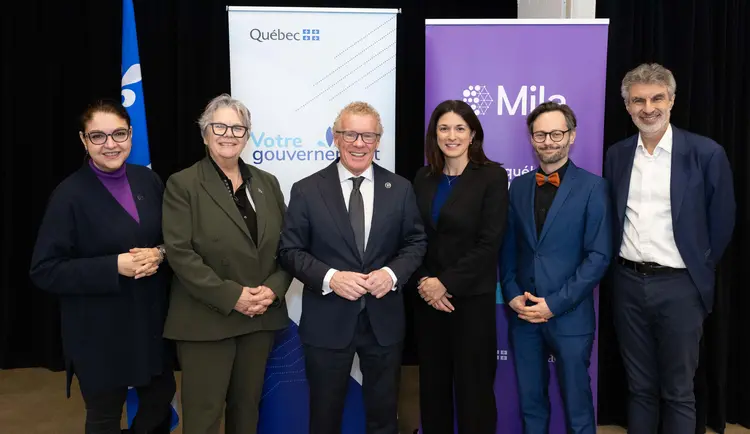
A startup out of Mila is rethinking the way deep learning is done in data poor environments, aiming to unlock the full potential of these technologies in drug discovery.
Yoshua Bengio, professor at the University of Montreal and Founder of Mila, the Quebec Artificial Intelligence Institute, will support Valence Discovery, formerly InVivo AI, in ongoing research in data-efficient deep learning and generative drug design.
“Breakthroughs in techniques for generative modeling and low data learning will play an important role in the future of AI-driven drug discovery, says Yoshua Bengio. We’re thrilled to see a young team out of the Mila ecosystem at the forefront of this field, and I look forward to supporting their future research in my role as scientific advisor.”
Founded in 2018 by a team of graduate students out of Mila, University of Montreal, and McGill University, Valence is developing novel algorithms for data-efficient deep learning in an effort to overcome data constraints in drug discovery.
Deep learning has seen huge success against many big data problems. But in drug discovery, where data generation is slow and expensive, and much of emerging biology is poorly characterized, many prediction tasks fall into the low data domain. Traditional deep learning algorithms, which require large amounts of pre-existing training data, have limited utility in these low data settings.
“Our work with these methods started almost 5 years ago following a drug design project our founding team did with Pfizer and Merck, says Prudencio Tossou, co-founder and Head of Research at Valence Discovery. Much of our current research is focused on meta-learning, or the idea of learning how to learn. In a meta-learning setting, we aim to learn generalizable chemical principles that we can exploit on new tasks, even if we don’t have access to large amounts of training data.”
“We’re making exciting progress with these methods and have validated early approaches in several live drug discovery programs. We’re also actively applying these methods in the hunt for new treatments for COVID-19, a pathogen we know little about and therefore have very little data for, says Daniel Cohen, CEO of Valence. We’re thrilled to have Yoshua Bengio’s support as we continue our work in bringing these methods to drug discovery.”
About Mila
Founded in 1993 by Professor Yoshua Bengio, Mila rallies the highest academic concentration of research and development in deep and reinforcement learning. Since 2017, Mila is the result of a partnership between the Université de Montréal and McGill University with École Polytechnique de Montréal and HEC Montréal. In its new premises in the Mile-Ex, Mila is creating a unique space for innovation in artificial intelligence that uses interactions with industry and fosters the emergence of start-ups while integrating the social impacts of the technology into its projects.
About Valence Discovery
Valence Discovery is committed to unlocking the true potential of deep learning in drug design by unifying best-in-class deep learning technologies with intuitive infrastructure to make these technologies more broadly accessible to R&D organizations of all sizes. Valence’s AI-enabled drug design platform has been extensively validated and is currently being used to identify and design drug candidates in collaboration with industry-leading partners. The company is pioneering the application of few-shot learning in drug design and is developing and deploying novel machine learning methods for molecular property prediction, generative chemistry, and multiparameter optimization. Valence (formerly InVivo AI) was founded in 2018, is advised by deep learning pioneer, Dr. Yoshua Bengio, and is proudly headquartered in Montreal at Mila, the world’s largest deep learning research institute, with an office in Cambridge, Mass. To learn more, please visit www.valencediscovery.com.





